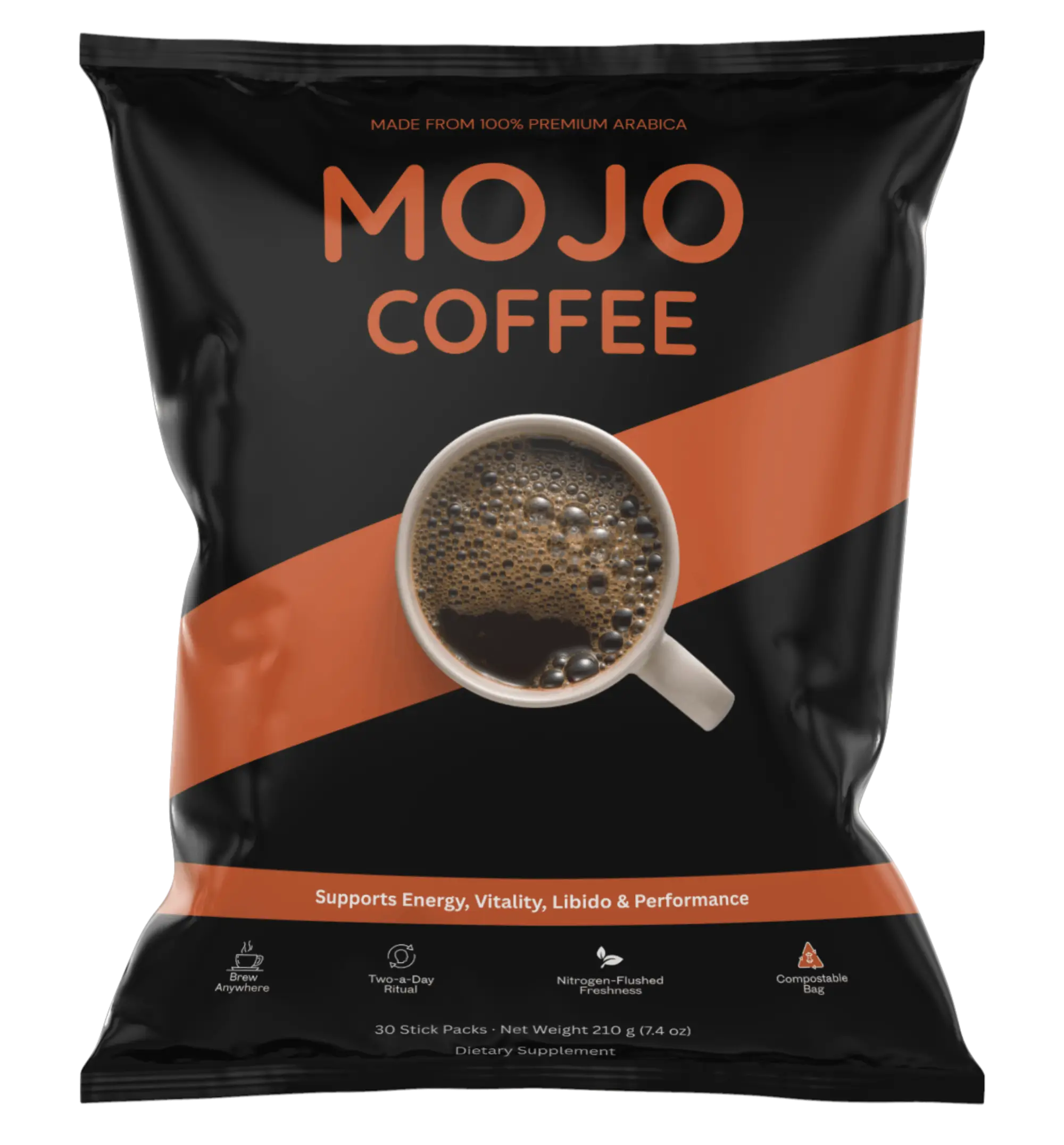
How Coffee and Adaptogens Can Boost Sexual Vitality
In recent years, many men in their 30s, 40s, and beyond have grown skeptical of pharmaceutical shortcuts and turned to natural or functional supplements to support vitality and sexual health. Among them, coffee and adaptogenic herbs have gained popularity as components of “biohacked” routines, as seen on 360iResearch.
The appeal is understandable: caffeine is already consumed daily by many, and adaptogens promise stress resilience and hormonal balance. But do they meaningfully support sexual vitality?
Sexual desire and performance are complex, involving energy metabolism, vascular function, hormonal signaling, and psychological state. When cumulative stress, poor sleep, aging, or metabolic issues interfere, libido and function can suffer.
The hypothesis behind combining coffee + adaptogens is that caffeine supplies acute energy and vascular support, while adaptogens modulate stress responses and stabilize hormones over time.
Understanding Sexual Energy
To appreciate how coffee or adaptogens might influence sexual vitality, it’s helpful to review the biological systems involved.
Hormonal Regulation
Testosterone (in men), estrogen (in women), and sex hormone binding globulin (SHBG) influence libido, sexual function, and sexual energy. Declines in free testosterone or rises in SHBG are often implicated in reduced sexual desire (especially in middle age).
Vascular Function & Nitric Oxide
An erection (in men) or genital engorgement (in both sexes) depends on blood flow. Nitric oxide (NO) is a key mediator: it relaxes smooth muscle in blood vessels, allowing dilation and increased perfusion. Disruption in NO signaling (for example, through endothelial dysfunction) impairs sexual function.
Neurotransmitters & Central Drive
Dopamine, norepinephrine, and endorphins modulate sexual motivation and arousal. Stress can elevate cortisol, which, in high chronic levels, may blunt libido via interactions with sex hormones or via central suppression.
Stress, Fatigue, and Libido
Chronic stress burdens the hypothalamic-pituitary-adrenal (HPA) axis, increasing cortisol and potentially disturbing hormonal balance and energy levels. Over time, this may reduce sexual drive or exacerbate erectile difficulties.
To support sexual vitality, interventions must ideally support energy metabolism, vascular function, hormonal balance, and stress resilience.
Coffee’s Physiological Impact on Energy and Libido

Image Credit: Chevanon Photography Via Pexels
Coffee is one of the most widely consumed beverages globally, largely due to its caffeine content. An estimated 2.25 billion cups of coffee are consumed around the world every day. Could its physiological effects translate into sexual benefits?
a) Evidence from observational studies on erectile dysfunction
In a cross-sectional U.S. sample by PMC, men consuming 170–375 mg/day of caffeine (roughly 2–3 cups of coffee) had lower odds of reporting erectile dysfunction compared to non-consumers (adjusted odds ratio < 1). However, in a long-term prospective cohort (Health Professionals Follow-up Study), overall coffee intake was not significantly associated with incident ED.
A recent meta-analysis of four cohort studies (≈ 51,665 men) found no statistically significant association between caffeine intake and ED (RR = 0.94, 95% CI 0.86–1.03). Thus, while some observational evidence suggests modest associations, causal linkage remains unproven.
b) Mechanistic plausibility
Caffeine acts as a nonselective phosphodiesterase inhibitor, raising intracellular cyclic guanosine monophosphate (cGMP), which supports smooth muscle relaxation and vasodilation — mechanisms relevant to erectile function. Coffee is rich in polyphenols and antioxidants, which may help endothelial health and improve nitric oxide bioavailability.
Coffee’s vascular and biochemical effects provide a plausible basis for modest support of sexual function, but evidence is not conclusive and should be treated cautiously.
Adaptogens: Herbal Allies for Stress, Hormones, and Endurance
Adaptogens are herbs or mushrooms that purportedly help the body adapt to stress, normalize physiological processes, and improve resilience. Some of the most studied in the context of libido and sexual health include ashwagandha, maca, rhodiola, ginseng, and cordyceps.
Ashwagandha (Withania somnifera)
A randomized, double-blind human study found that standardized ashwagandha extract improved subjective sexual well-being and increased serum testosterone in men compared to placebo.
In one 8-week crossover study of older, overweight men, ashwagandha supplementation correlated with a ~15% increase in testosterone and improvements in “energy/vitality” self-ratings. In women, a trial indicated improved sexual satisfaction and quality of life. The evidence suggests some potential benefit, though not yet definitive.
Maca (Lepidium meyenii)
In a pilot, double-blind randomized trial, maca (3 g/day) improved sexual function scores (ASEX, MGH-SFQ) in adults with antidepressant-induced dysfunction over 12 weeks. In male libido studies, a 2002 trial showed men taking 1.5–3 g maca/day reported increased libido vs placebo.
Rhodiola, Ginseng, Cordyceps
Evidence for ginseng in female sexual dysfunction is weak; a meta-analysis found no statistically significant effect. Some animal and in vitro data suggest cordyceps may enhance oxygen utilization, stamina, and possibly sexual function, but human trials specific to libido are sparse. Rhodiola rosea is better known for fatigue relief; its direct effects on sexual function remain underexplored.
Caveat: In all cases, human clinical trials are limited in number and sample size. Adaptogens may support stress balance and energy more reliably than direct sexual enhancement.
The Coffee + Adaptogen Synergy

Image Credit: Chevanon Photography Via Pexels
Why combine coffee with adaptogens? The conceptual synergy lies in balancing stimulation and recovery.
- Coffee provides acute energy, alertness, and mild vascular support.
- Adaptogens may modulate stress responses (dampening excessive cortisol) and stabilize hormonal swings, reducing potential “crash” after caffeine.
- Together, they may offer sustained energy and support for neuroendocrine balance.
For instance, an ashwagandha-coffee blend might blunt the cortisol surge from caffeine, promoting steadier energy. Another approach is mushroom + caffeine blends (e.g., cordyceps, lion’s mane) that aim to combine adaptogenic and stimulant effects.
While direct clinical trials of combined adaptogen + coffee formulations for sexual vitality are lacking, the mechanistic rationale is plausible based on what we know about individual components.
Top Adaptogens for Sexual Vitality
Below is a quick comparative snapshot of adaptogens most often associated with sexual or vitality claims, along with practical notes:
| Adaptogen | Primary Evidence / Mechanism | Practical Considerations |
|---|---|---|
| Ashwagandha | Human RCTs show improved sexual well-being, increased testosterone, and better vitality scores. | Commonly available in 300–600 mg doses; avoid in hyperthyroidism, pregnancy, and autoimmune disease without medical supervision |
| Maca | Some trials show improved libido and sexual function scores vs placebo. | Typical dose: 1.5–3 g/day; may take weeks to show effect |
| Ginseng | Mixed; limited human support for women; more data in men (erectile enhancement). | Potential stimulant; interactions with blood pressure, anticoagulants |
| Cordyceps | Animal/athletic performance data; hypothesized oxygen and endurance support | Commercially available in 1–3 g extract doses |
| Rhodiola rosea | Better evidence for fatigue relief; less direct data on libido | Can be stimulating; use earlier in the day |
Given the current evidence, ashwagandha has the strongest human clinical support for sexual well-being. Maca is modestly promising. Others may be supportive indirectly through their energy and stress levels.
Integrating Coffee and Adaptogens Into Daily Life
If you decide to experiment with a coffee + adaptogen strategy, here’s a practical guide:
Timing & dosing
Use 2–3 cups of coffee (≈ 170–375 mg caffeine) as a moderate range, which is associated in some studies with lower ED prevalence. Introduce adaptogens gradually (e.g., start with 300 mg of ashwagandha or 1 g maca) for 4–8 weeks and monitor subjective effects.
Ideally, consume coffee earlier (morning/early afternoon) to avoid sleep disruption.
Recipes & blends
- Adaptogenic latte: Brew coffee, add powdered ashwagandha or maca, and a healthy fat (e.g., coconut milk) for better absorption.
- Mushroom coffee blends: Use instant blends combining coffee + cordyceps, lion’s mane, etc.
- Stack approach: Coffee in the morning, adaptogen capsules later
Consistency & patience
Results from adaptogens may take weeks (similar to other botanical supplements). Track libido, energy, sleep, stress, and sexual performance over months.
Avoid overreliance
These should complement, not replace, broader lifestyle practices (sleep, exercise, nutrition). Monitor for tolerance or side effects and pause periodically.


